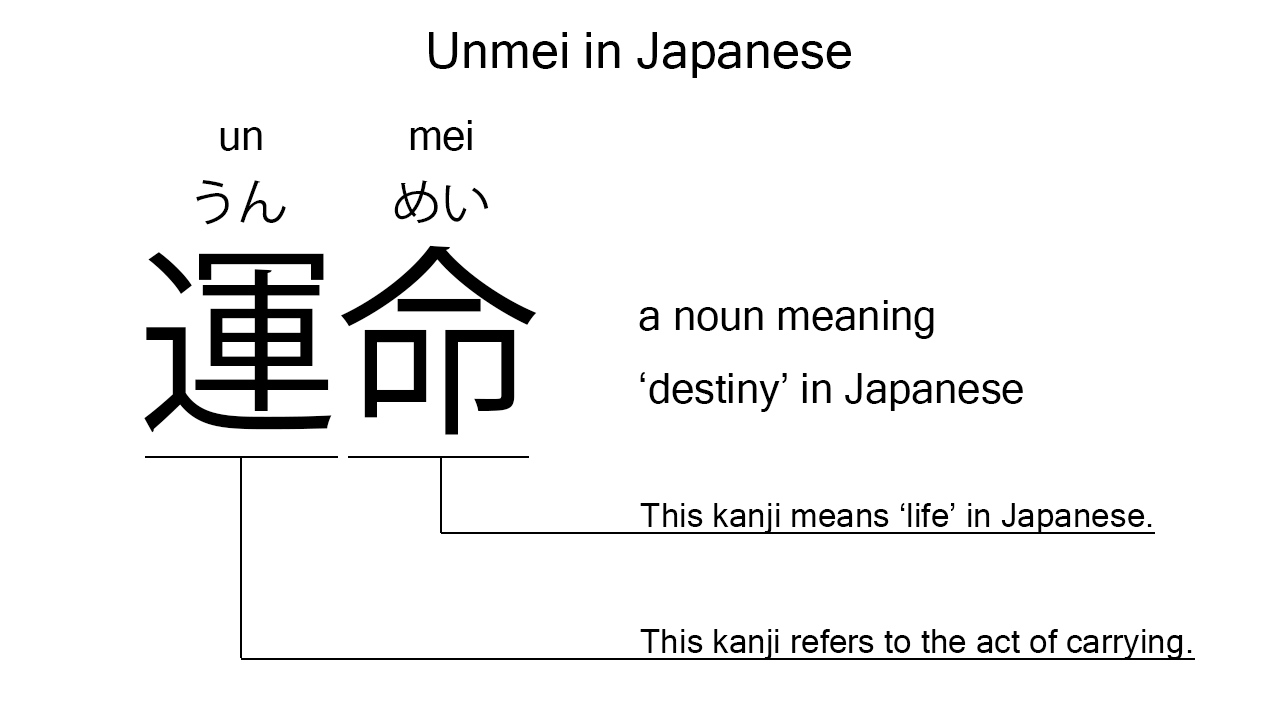What does “unmei” mean in Japanese?
Native speakers say “unmei” often to mean ‘destiny’ in Japanese. Perhaps, some Japanese learners know this word as it is sometimes used in Japanese movies, novels, songs, manga, anime, and the like. In this blog post, however, I will explain this word in detail based on its kanji expression. And also, I will explain how to use it through example sentences. My explanations would help Japanese learners understand “unmei” more clearly. Then, let’s get started!
Contents
Definition and meanings of “unmei”
Let me start with the definition and meanings of “unmei”.
- unmei – 運命 (うんめい) : a noun meaning ‘destiny’ or ‘fate’ in Japanese. This can also work as plural. Learn more about Japanese plural.
Japanese native speakers use this noun to refer to things and events which happen to someone’s life. So, this can work in more or less the same way as the English nouns, “destiny” and “fate”, I think.
The definition and meanings are simple and clear. To understand this noun more clearly, however, let me explain its kanji characters in detail, one by one.
What does “unmei” literally mean in Japanese?
The kanji expression of “unmei” consists of the following two kanji characters:
- 運 : a kanji character used to refer to the act of carrying or delivering. This kanji can also be found in other words like “hakobu“.
- 命 : a kanji character used to mean ‘life’.
From these two kanji characters, we can understand that “unmei” literally means a ‘carried life’ in Japanese. This literal interpretation is not completely in line with the actual meanings, but still understandable, I think. A destiny can be considered as the things carried to someone’s life.

When we meet new kanji expressions, we should check their kanji characters in detail to understand their meanings clearly and deeply. In many cases, kanji characters tell us a lot about the meanings of the expressions they form. Actually, here, we could get the better understanding of “unmei” through the detailed kanji check above.
So far, I’ve explained the definition and meanings of “unmei” together with its kanji characters. Then, let me explain how to use it through the example sentences below.
Example #1: how to say “destiny” in Japanese
boku tachi wa unmei wo shinjiru – 僕達は運命を信じる (ぼくたちはうんめいをしんじる)
We believe in destiny.
Below are the new words used in the example sentence.
- boku – 僕 (ぼく) : a pronoun meaning ‘I’ in Japanese. This is used mainly by boys and young males.
- tachi – 達 (たち) : a suffix used after a noun or pronoun to make its plural form. In the example, this is used after “boku” to make its plural form, “boku tachi”, which means ‘we’ in Japanese.
- wa – は : a binding particle working as a case marker or topic marker. In the example, this works after “boku tachi” to make the subject in the sentence.
- wo – を : a case particle used to make the object word in a sentence. In the example, this is used after “unmei” to make the object in the sentence.
- shinjiru – 信じる (しんじる) : a verb meaning ‘to believe’ in Japanese.
This is a typical usage of “unmei”. In this example, it works together with the case particle, “wo”, to become the object in the sentence. When we want to mean ‘destiny’ in Japanese, anyway, this noun is a very good option.
Example #2: another usage of “unmei”
kanojo wa unmei no hito desu – 彼女は運命の人です (かのじょはうんめいのひとです)
She is my destiny.
Below are the new words used in the example sentence.
- kanojo – 彼女 (かのじょ) : a pronoun meaning ‘she’ in Japanese.
- no – の : a case particle joining two nouns. Normally, the first one can work as a modifier to describe the second. In the example, this works to join “unmei” and “hito”. The formed phrase literally means ‘a person of destiny’ in Japanese. Word orders in Japanese and English are different, but the role of this case particle is very similar to that of the English preposition, “of”. The phrase is often translated into English as “someone’s destiny”, “soul mate”, or such, though.
- hito – 人 (ひと) : a noun meaning ‘person’ or ‘people’ in Japanese.
- desu – です : an auxiliary verb used after a noun or adjective to make it polite. Probably, this is well known as a part of Japanese desu form. In the example, this is used after “unmei no hito” to make it sound polite.
This is another typical usage of “unmei”. In this example, it works as a part of the commonly-used phrase, “unmei no hito”, which means “someone’s destiny”, “soul mate”, or such in Japanese.
Summary
In this blog post, I’ve explained the definition and meanings of “unmei” in detail based on its kanji expression. And also, I’ve explained how to use it through the example sentences. Let me summarize them as follows.
- unmei – 運命 (うんめい) : a noun meaning ‘destiny’ or ‘fate’ in Japanese. This can also work as plural. These two kanji characters literally mean a ‘carried life’ in Japanese. This literal interpretation is not completely in line with the actual meanings, but still understandable, I think. A destiny can be considered as the things carried to someone’s life. When we want to say “destiny” or “fate” in Japanese, this noun is always a very good option.
Hope my explanations are understandable and helpful for Japanese learners.